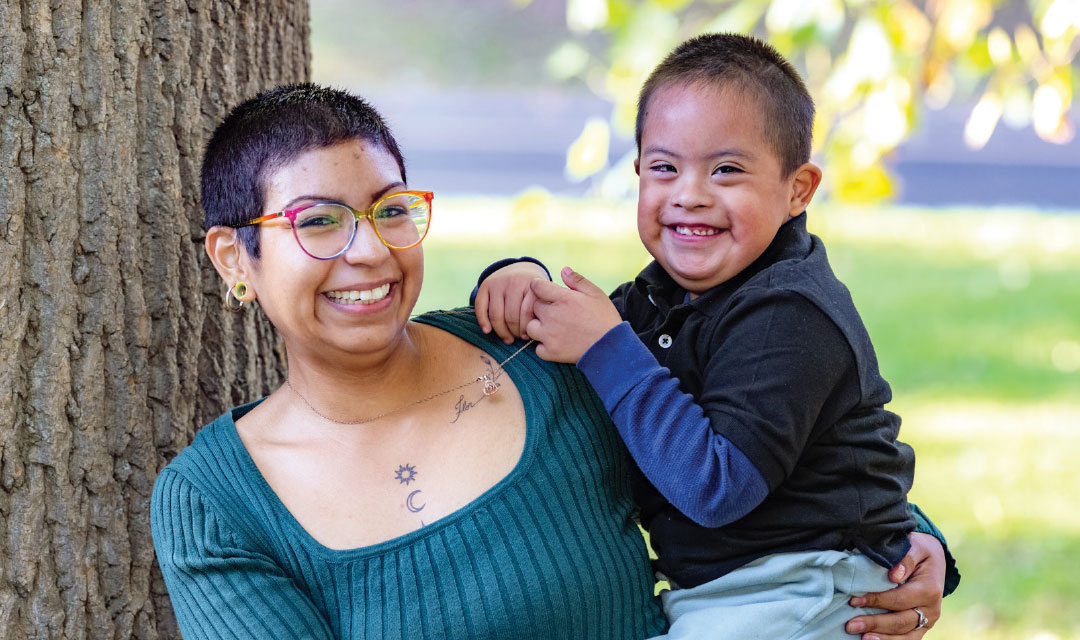“I feel so much better and more confident.”

After years of trying to lose weight without success, Ashely Restrepo was ready to make a big change. “I’ve always struggled with my weight, ” says the 25-year-old Newark resident. But no matter what type of diet she tried, nothing seemed to work. “I just kept going up on the scale,” she says. In 2021, when 5’4" Ashely’s weight had reached 292 pounds, she decided to undergo gastric bypass surgery. Alan A. Saber, MD, Director of the Bariatric and Metabolic Surgery Program at Newark Beth Israel Medical Center (NBI), performed the surgery that April. Since then, Ashely has shed about 120 pounds, and, she says, “I feel so much better and more confident.”

Ashely decided to explore bariatric surgery when she realized that she was struggling to keep up with her son, Samuel, now 5. “I was playing with him on the floor, and I couldn’t really move or breathe well,” she recalls. Her mom, Selenia, had already undergone successful bariatric surgery with Dr. Saber, and Ashely wanted to see if she was a candidate.
Launched in 2018, NBI’s Bariatric and Metabolic Surgery Program—which has been accredited as a Comprehensive Center by the Metabolic and Bariatric Surgery Accreditation and Quality Improvement Program (MBSAQIP®) for meeting the highest patient safety and quality standards— offers patients a range of minimally invasive weight loss surgery options. Led by Dr. Saber, the program features a multidisciplinary team of specialists who collaborate to address patients’ weight-loss needs as well as comorbidities associated with obesity.
To be considered for bariatric surgery at NBI, patients must have a body mass index (BMI) of 35 to 40 and medical problems associated with obesity, or a BMI higher than 40 with or without medical problems. They must show that they’ve tried to lose weight prior to surgery but were not successful, and they must be committed to making permanent changes to their lifestyle through diet and exercise.
In addition, prior to surgery, patients must gain medical clearance for surgery and undergo a psychological evaluation to ensure that they understand the risks and benefits of the surgery and will be compliant with diet and exercise guidelines. Patients also must meet with a registered dietitian to discuss eating behavior and learn what will be expected of them before and after surgery and must also undergo an endoscopy to check for abnormalities in the stomach, such as tumors. Additional evaluations are sometimes needed for patients with special health issues, such as heart or lung problems.
“There are many benefits to bariatric surgery since every system in the body can be affected by obesity, including the heart, lungs, GI tract, kidneys and liver,” says Dr. Saber.
According to the Centers for Disease Control and Prevention, obesity affects nearly 42 percent of U.S. adults, and obesity-related conditions including heart disease, stroke, Type 2 diabetes and certain types of cancer are among the leading causes of preventable, premature death.
“When you lose weight and because of hormonal changes from bariatric and metabolic surgery, you can have improvement or even resolution of these medical problems,” Dr. Saber explains.
With a BMI of about 50, Ashely met the requirements for bariatric surgery. She chose to have gastric bypass surgery due to its high weight loss success rates. NBI offers Roux-en-Y gastric bypass surgery, the most common type of gastric bypass, which involves creating a small pouch from the stomach and connecting it directly to part of the small intestine.
“After gastric bypass, food goes from the mouth to the esophagus to the gastric pouch, then to the small intestine, bypassing the stomach,” says Dr. Saber. The pouch holds less food, which can help patients eat less and feel full faster. The rerouting of the digestive system allows patients to absorb fewer calories, though they also absorb fewer nutrients, from food.
Ashely returned home the day after her surgery. She followed a liquid diet for two weeks before transitioning to soft foods and then to solid foods after four weeks. She experienced rapid weight loss at first, about five to six pounds per week. She continued to lose weight by eating smaller meals packed with more vegetables and protein and working out with a personal trainer three times a week. “On the days I don’t meet with my trainer, I do cardio at the park or the gym,” she says.
Thanks to her dramatic weight loss, Ashely says she can finally live her life to the fullest. “I can walk up and down the stairs without being breathless, and it feels great,” she says. “I can even chase my son around the house and yard!”
3 Popular Types of Bariatric SurgeryNBI’s Bariatric and Metabolic Surgery Program offers three bariatric surgery options. “All are minimally invasive laparoscopic procedures involving four to five small incisions,” says Dr. Saber. “We have excellent outcomes and almost all of our patients require just one night in the hospital.” The three bariatric surgeries offered at NBI are:
|
To learn more about weight loss surgery at Newark Beth Israel Medical Center, call 973-926-7000.